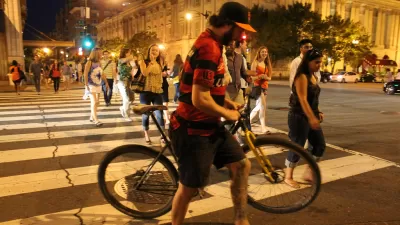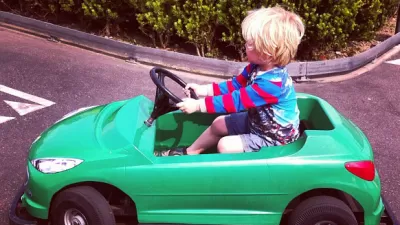Millennials are less likely to get driver's licenses, they tend to take fewer, shorter car trips, and they use alternative modes of transportation more than their predecessors. The question for the ages is why.

Emily Badger follows up on the growing body of evidence that Millennials are driving less to ask why that is. For instance: "Are millennial driving habits a byproduct of the weak economy? (If you have no job to go to, chances are you drive less.) Or do they signal deep and permanent shifts in the American relationship to automobiles?"
These questions are the subject of a report by U.S. Public Interest Research Group and the Frontier Group released on October 14, 2014, titled "Millennials in Motion: Changing Travel Habits of Young Americans and the Implications for Public Policy."
After acknowledging that these questions won't be answered for at least several years, Badger explains that the report finds that "the case is growing stronger for a major and lasting change in how today's youngest would-be drivers — and those to follow them — use cars." Moreover, the study argues that "it's time to rethink how we subsidize, encourage and invest in car use."
The article goes on to break down the technology argument (i.e., "maybe they simply chose not to [to drive], precisely because they now have more and better alternatives"), the economy argument (i.e., "long-term socioeonomic shifts underway that will likely continue to affect car use even after the economy fully recovers")., and the cultural argument (i.e., "the underlying cultural preferences of millennials are changing).
FULL STORY: The many reasons millennials are shunning cars

Alabama: Trump Terminates Settlements for Black Communities Harmed By Raw Sewage
Trump deemed the landmark civil rights agreement “illegal DEI and environmental justice policy.”

Study: Maui’s Plan to Convert Vacation Rentals to Long-Term Housing Could Cause Nearly $1 Billion Economic Loss
The plan would reduce visitor accommodation by 25% resulting in 1,900 jobs lost.

Planetizen Federal Action Tracker
A weekly monitor of how Trump’s orders and actions are impacting planners and planning in America.

Wind Energy on the Rise Despite Federal Policy Reversal
The Trump administration is revoking federal support for renewable energy, but demand for new projects continues unabated.

Passengers Flock to Caltrain After Electrification
The new electric trains are running faster and more reliably, leading to strong ridership growth on the Bay Area rail system.

Texas Churches Rally Behind ‘Yes in God’s Back Yard’ Legislation
Religious leaders want the state to reduce zoning regulations to streamline leasing church-owned land to housing developers.
Urban Design for Planners 1: Software Tools
This six-course series explores essential urban design concepts using open source software and equips planners with the tools they need to participate fully in the urban design process.
Planning for Universal Design
Learn the tools for implementing Universal Design in planning regulations.
Caltrans
Smith Gee Studio
Institute for Housing and Urban Development Studies (IHS)
City of Grandview
Harvard GSD Executive Education
Toledo-Lucas County Plan Commissions
Salt Lake City
NYU Wagner Graduate School of Public Service




























